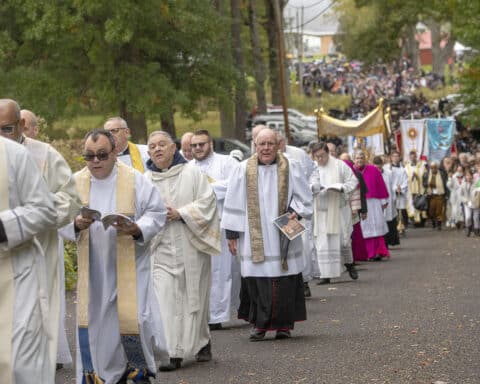
— Name withheld, Baltimore, Maryland
Answer: Sloth, which is one of the seven capital sins, is sorrow or aversion to the good things that God is offering us. And, thus, one who has sloth and hears that God can save them from sins and enable them to do many good works, instead of being happy and eager to embrace these gifts, has a kind of sadness or aversion to them. Perhaps they like their sins and would rather not be free of them. Perhaps the thought of good works seems burdensome. So the slothful person becomes avoidant of God and the gifts that he is offering.
While this is often manifest through a kind of laziness or inattentiveness, sometimes the opposite is true. And, thus, some slothful people immerse themselves in worldly activities such as business and career, and claim they are far “too busy” to pray, to think about God or go to Church.
Therefore, at its heart, sloth is a problem about desire — namely, that we do not ardently desire God and the things he is offering.
I might encourage you to pray out of the beatitude, “Blessed are they who hunger and thirst for righteousness, for they will be satisfied” (Mt 5:6). In other words, we ought to ask for the desire for God and what he offers, if we don’t even have that.
Second, I would counsel that while praying for greater desire, some small and initial steps be made toward God. Look for something you can reasonably do, which may not be highly desirable at first but still can be reasonably accomplished. Before I was a priest, I worked in downtown Washington, and I made a Lenten resolution to go to daily Mass at my lunch break. At first, this seemed difficult and irksome. But gradually, I grew to like it, and when Easter came, I just kept going to Mass almost every day to experience its peace and the nourishment of God’s word and his body and blood. Often life works like this. We ask for deeper desire and step out on our request by small actions that build.
Time for indulgences
Question: Indulgences used to be designated by time value: 100 Days, 500 days etc. Now, only the terms partial and plenary are used. Why the change?
— Peter Stein, Everett, Washington
Answer: This change to “partial” or “plenary” occurred in 1968 when the Enchiridion of Indulgences was issued. There are several reasons this was done.
First, the designation of “days” did not originally reference that time in purgatory could be lessened. The origin likely had more to do with the penitential practices of the early Church, which were often lengthy and somewhat severe. Given this, one could visit the confessors of the Faith in jail or who had once been jailed for the practice of the Faith. Given the esteem these confessors of the Faith were held in by the Church, such a visit and the promise to say prayers often resulted in time being knocked off one’s penance by the bishop. Where and when this designation of days, weeks and years came to be applied to the souls in purgatory by the faithful is not exactly clear.
The second problem of designating a time value to indulgences is that we are not certain that purgatory runs on an earth clock. How time passes there, or if there is time, or how time here relates to time there is all uncertain.
The third problem is that the merit of a prayer or action depends not only on the action done but on the dispositions and state of soul of those who do them. Exactly how fruitful the saying of the Rosary is may not be something we can simply gauge by assigning a number.
Most prayers are not sacraments but sacramentals. Even indulgenced acts related to the reception of the sacraments do not pertain to the sacrament itself, but to the fruitfulness of the reception of it and the application of those fruits to another. Hence, we are not speaking of something that works automatically (ex opere operato) but rather something that depends for its fruitfulness, to a large extent, on the disposition of the one who does it (ex opere operantis).
Most people did find the old system of days, weeks and years to be helpful at gauging the general fruitfulness of certain acts or prayers. Currently, however, the Church seems to prefer to leave matters such as this less clearly specified for all the reasons stated. And while common sense might value the Rosary above a brief prayer or aspiration, even here it is sometimes best to leave things up to God, who sees not only the appearance but looks into the heart.
Msgr. Charles Pope is the pastor of Holy Comforter-St. Cyprian in Washington, D.C., and writes for the Archdiocese of Washington, D.C. at blog.adw.org. Send questions to msgrpope@osv.com.





